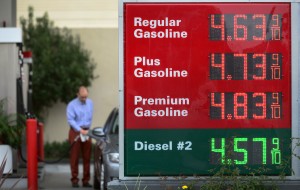
A new study says that when Californians were paying more at the pump for gas this spring and fall supply was actually increasing.
Independent energy analyst Robert McCullough told a California State Senate Select Committee today he can't rule out the possibility that Chevron, Shell and Exxon manipulated prices.
McCullough analyzed data on nitrogen oxide emissions from the state's oil refineries. He found that in May and October, despite reports of outages and shutdowns, they continued to produce enough gasoline to cause inventories to rise.
"If you were actually buying and selling gasoline, and the amount of gasoline is increasing in the market, you're wondering why we would have the largest price spike in our history at that exact moment," McCullough said.
A spokesman from the Western States Petroleum Association told lawmakers he could not explain what caused the price spikes.